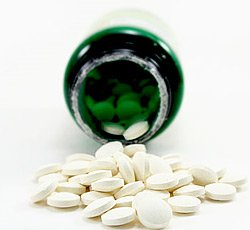 Taking supplements of folic acid is linked to a doubled prostate cancer risk. This was a conclusion made by University of Southern California researchers whose report was published by the Journal of the National Cancer Institute. Jane Figueiredo and her colleagues examined the data on health status of 643 men with an average age of 57.4 years. Half of the participants took vitamin-rich biological supplements that contained 1 mg of folic acid while others took placebo.
Taking supplements of folic acid is linked to a doubled prostate cancer risk. This was a conclusion made by University of Southern California researchers whose report was published by the Journal of the National Cancer Institute. Jane Figueiredo and her colleagues examined the data on health status of 643 men with an average age of 57.4 years. Half of the participants took vitamin-rich biological supplements that contained 1 mg of folic acid while others took placebo.
Over 6.6 years of observation 34 participants were diagnosed with prostate cancer. Having analyzed acquired data, the researchers calculated the prostate cancer risk at 10 years. According to their estimates, the prostate cancer risk was 9.7 percent in men who took biological supplements with folic acid, compared with 3.3 percent for those who took placebo. Hence those who take folic acid supplements face more than two times greater risk of getting this type of cancer, the researchers assert.
The mechanism behind folic acid’s carcinogenic effect is not known in detail. However, researchers speculate that the role of this vitamin in nucleotide synthesis, which is a prerequisite for cancer cell proliferation (reproduction), has something to do with it.
However the negative effect of folic acid is true only for a synthetic form of it. A series of studies have shown that eating foods rich in folic acid (spinach, onions, salads), on the contrary, has a protective effect with some types of cancer, including prostate cancer. This difference can be attributed to the fact that synthetic folic acid is more readily available to the body than the folic acid from foods. Therefore when taking supplements, more folate may be assimilated than it is with natural folate, which may play a certain negative role.